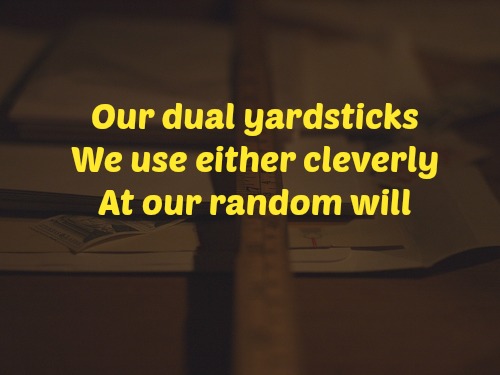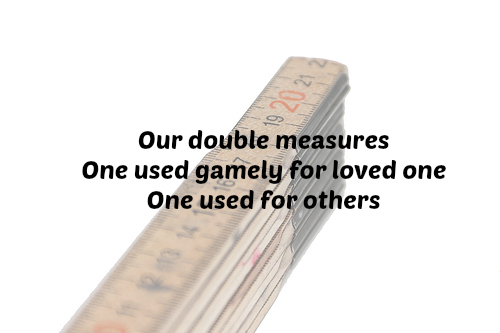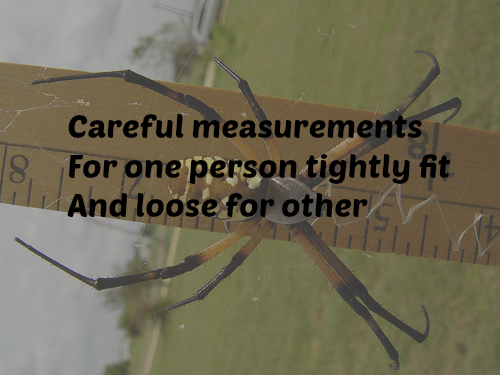How to relate to people who practice double standards

By Michelle Liew


“[O]ne person's 'barbarian' is another person's 'just doing what everybody else is doing.”
Intellectual cultural celebrity, activist, American writer and esteemed professor Susan Sontag described the nature of double standards to a fitting T when she summarized it in this sentence.
A double standard, by definition, is the application of different principles in similar situations, and often leaves a feeling of dissatisfaction because of lack of fair treatment. In the realm of office politics, a boss applies different forms of treatment to similarly ranked subordinates. In the home, a parent may discipline a set of twins with completely different rules for each.
Granted, there are some situations where different sets of standards have to be applied, depending on the situation in question, and on an individual’s sometimes compelling need.
In general, people apply double standards without being aware of this sometimes rather grating action. Why does this happen? Which double standards are we unconsciously guilty of? How do we relate to those who are often practicing them and when does it sometimes become necessary to apply different sets of standards?

The double standard of beauty
What is your opinion of the above video
Why double standards are practiced
Double standards in many societal situations are unfortunately practiced and have, many a time, been seen as unnecessary, harsh and offensive. The reason why it happens is elusive, framed in one way and mollifying in another.
Societal norms
Social norms regarding the treatment of gender, race or age have, often in history, caused dual sets of standards to emerge.
Norms, of course, evolve to become prevalent ways of thinking, deeply seeded in human subconscious such that people do not even realize that they have such patterns of thought. They then lead to different forms of treatment and applications of standards as a whole.
Individual relations
Our relationships with others are unique. Whether we are conscious of it or not, we see everyone in a different light the greater the depth of the relationship.
A case in point would be that of parents raising children. A parent may apply different sets of standards with the elder as opposed to the younger, either because his relations with each are special, or because of the lessons he has learned along the way viz parenting.
Personal paradigms
We have all been brought up having value judgements. Whether we like to admit it or not, these paradigms lead us to have personal preferences that causes us to approach different people, perhaps in the same situation, differently. We may not even realize this until it is pointed out.
A saleslady I was observing a few days ago showed this rather clearly. She was quite brusque with me, but more gentle with an elderly lady lining up behind me to pay for her groceries.
Unclear perspectives
There are times when people will sometimes find excuses to support their own beliefs. Perspectives become a little unclear, and different standards of practices emerge. It happens in matters of faith, politics and family.


The double standards we are guilty of
Many of us are guilty of applying double standards, to a greater or lesser degree. These are some everyday situations, whether we are aware of them or not, where it does happen!
Queues
I will be the first to admit that I experience this every time I am lining up at the Automatic Teller Machine for a quick cash withdrawal (I wish for more deposits, yes.) I get very angsty and impatient with long queues, and grumble to my husband incessantly when the lady in front of me takes a longer than usual moment to transfer money into another account.
When the situation is reversed, my frame of mind changes. When I become the person who needs a longer moment at the machine, and those at the back of the queue start clicking their tongues and tapping their feet, I start nitpicking their impatient behavior.
There is a classic example of everyday double standards.
Driving
When driving, we might switch lanes and end up just next to a car that had just driven forward. The driver honks, and we get defensive.
In the reverse situation, someone abruptly switches lanes and ends up just in front of us. We honk and criticize the driver for bad driving!
There we have the double standards of motorists.
Jokes
Admit it - we are all guilty of having a laugh at another person’s expense, be it out of good nature or otherwise.
Yet, were the situation reversed and the joke is leveled against us, the reaction is not as positive, even if we claim not to mind the friendly insult.
Defensiveness rises when it is our own ego being challenged.
Toys
It has always been the norm for boys to play with toys like trucks, robots or the good old remote control car, while girls play with the ever present Barbie doll.
When I was younger, I used to like a range of Star Wars toys my parents insisted were for boys.
Thankfully, such mindsets are changing!
Parents and children
As I have mentioned before, some parents have different approaches to raising their children.
My husband used to complain that his younger brother used to be allowed to come home late without a curfew, while he, being the older son, was rather protected and not allowed to spend time with his friends as a teenager.
A double standard, certainly. Yet it could also be the result of a lesson learned along the way in having to release a few strings when raising children.
Unequal treatment in the workplace
A boss may make different allowances depending on his relationship with his subordinates, even if they are of the same rank.
As is the nature of politics, those who have that little leeway tend to get a little further ahead, even if abilities are on par.


How do we relate to people who have double standards?
We will always come across those who implement different standards for us and others, and do so unfairly. Difficult as this may be, we will come across them frequently enough. How do we tread the difficult relationship paths with them?
Be discerning.
Have a listening ear to determine if you are being treated unfairly. Determine if it is an actual double standard before raising any complaint because jumping to conclusions might harm relations unnecessarily.
Ask questions
If we are fully aware that the other party is practicing a double standard, you can raise some pointed questions to make him or her aware that he is practicing unequal principles.
The other party may not actually be aware that he has divided beliefs. Being subtle when raising these questions so as not to challenge ego is extremely important. Asking questions is helpful if the party concerned can accept constructive criticism.
Have knowledge, and if necessary, documentation.
If we feel that our bosses have given us unfair evaluations, all is not lost. Companies often have systems in place to ensure proper assessment of staff members.
But this is where proper documentation of our accomplishments is necessary. If we feel that we have been given a wrong evaluation, have the documentation handy so that the issue can be raised with the relevant authorities. This is where many may fall short - keeping track of everything can be quite a task!
Be patient and sincere.
As with all mindsets, it takes a long time for a person with double standards to shift his paradigm.
It is patience, and sometimes great patience and showing him that you mean well and just ask for a little fairness in treatment.
Do not judge others for their beliefs.
We have our own too, so we should not practice double standards ourselves by passing what may be overly harsh judgement.
Remembering that we have our particular biases ourselves might help us cope when we come across someone who outwardly displays theirs.

Double standards at the workplace
When are double standards necessary
There are times when we are forced to implement dual standards for others, though this is not because of bias or preconceived notions. The trick is determining the right time!
Forming sports teams
Men and women do not share the same physical structure, so it will not be so equitable to let them compete with each other in a similar sporting arena. We have to score their performances on different standards, because of different physical strength. Why else would we have mens’ and womens’ sports teams?
Addressing special needs
As far as possible, those with special needs should be fully included in society. Someone who is wheelchair bound but who has every skill possible to perform at the workplace should be fully considered as a staff member.
The only difference is that there should be a provision for his needs, if he is on a wheelchair or if he suffers any other physical disability. I had an inclusive class with a few children with special needs, who required extra time for tests.Some of them did even better than their able bodied counterparts.


The Senryu
The senryu is a Japanese form of poetry, very much like the haiku in structure. Unlike the haiku, which focuses on the beauty of nature, the senryu is written as a comment on human nature. It lends itself to being slightly poignant and satirical.
LIke its counterpart, the Haiku, it has five syllables in the first line, 7 in the second, and another 5 in the third.
Enjoy the senryu i present in photographs I have placed throughout this article.


Conclusion
Double standards are not likeable by any means, though in certain situations necessary. I would like to thank those who answered the question “How do you deal with people who practice double standards?” Do spare some time to pay each of them a visit via the link provided.
Original work by Michelle Liew Tsui-Lin
All rights reserved







